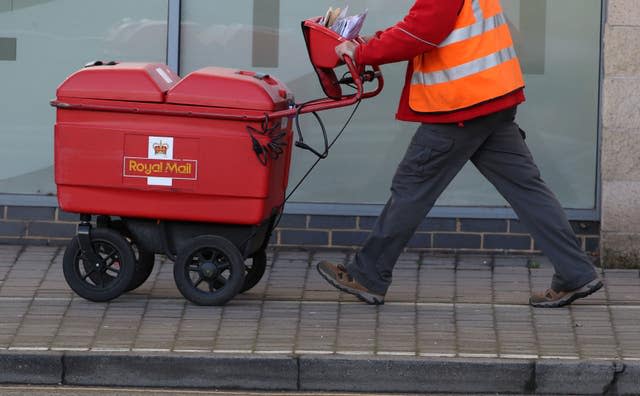Royal Mail: Key findings from Ofcom’s review into the postal service
Industry watchdog Ofcom has warned that the UK postal service risks becoming “unsustainable” without reform and looked at potential changes at Royal Mail.
In a review update published on Wednesday, the regulator said Royal Mail could be allowed to cut its letter deliveries to five days a week, or even three, under a series of options to overhaul the postal service.
Royal Mail has called for changes to its postal service obligation, which currently requires the business to deliver letters six days a week.
However, many people across the UK have said they still rely on regular deliveries.
We are clear that downgrading delivery targets for post is not an option for reform of the universal service.
Any future changes must improve reliability, which our research found people value along with affordability. pic.twitter.com/D4VRuOHdwP
— Ofcom (@Ofcom) January 24, 2024
Here the PA news agency looks at the key findings from the regulator’s report:
– Most Britons still need postal services
Ofcom’s review specifically looked into the viability of Royal Mail’s legal obligation to deliver letters six days a week to all 32 million addresses in the UK for the price of a stamp, no matter where the letters are going.
It is also required to deliver parcels five days a week, as part of this.
The regulator surveyed thousands of postal service users as part of the review, asking them about their requirements.
Almost four-fifths – 79% – of more than 2,000 people questioned said there are “some things they will always need to send by post”.
Three-quarters of postal users rely on post for letters.
But how we use post has changed. Without reform, the universal service risks becoming unsustainable.
We’re inviting views on our evidence – including those who are vulnerable/in rural areas. ⬇️ https://t.co/G6Kn8ExaDU pic.twitter.com/DX8GXZDp2h
— Ofcom (@Ofcom) January 24, 2024
Around 65% stressed that it remains an important way of communicating with friends and family despite the increasing availability and popularity of other options, such as social media or other messaging.
However, this reflected a decline, after previous polling in 2015-16 found that 73% of people saw it as an important communication channel.
The review found that 74% said they are reliant on Royal Mail for sending and receiving letters and cards.
It found that older age groups – those 65 and older – are particularly dependent on it, with 83% supporting this, reducing to 65% for those aged between 16 and 34.
– Social importance of post
The high level of use among older Britons also aligns with comments in the review that many see a strong social value to the postal service.
Elderly and less mobile people in particular reported that they see the post as a “vital tool to connect with the outside world and maintain contact with their families and relatives”.
The survey found 57% of users said they would feel cut off from society without being able to send and receive post.

Some people also said they find postal workers play an important role in their lives and community.
Respondents also stressed that they are often more comfortable receiving hard copies of items such as bank statements and financial documents.
– Lower demand for letters
The watchdog reported that demand for posting letters has noticeably declined in recent years.
Since the Postal Services Act was passed in 2011, the legal obligations on universal service provider Royal Mail have largely remained the same but the volume of letters has halved.
It dropped from 14 billion in 2011 to roughly seven billion in the 2022/23 financial year, with the rate of decline accelerating more recently.
This is a key consideration for the potential reforms.

Royal Mail has argued that this justifies cutting the number of days when letters must be delivered from six, with both five days and three days being looked as potential options.
However, the Government, which would need to change the law, has said it will “not countenance” scrapping Saturday deliveries.
– Parcels are on the up
While demand for letters has dipped, volumes of parcels – another area covered within Royal Mail’s service obligation – have increased.
This rose to a record 3.6 billion in the 2022/23 financial year.
Parcel volumes in Europe as a whole grew by around 14.6% each year between 2017 and 2021 following rapid growth in online retail.

– Reliability and price important to users
Ofcom’s research found that the affordability and certainty of arrival are the most important attributes people expect in the postal service.
It found more users prioritised these considerations over the speed of delivery, as long as next-day options are available for occasional use.
Surveys found that 91% of postal users ranked affordability as important, while 88% said reliability is important to them.
This compared with 58% of those who ranked Saturday delivery as important.
Small businesses particularly stressed the importance of reliability of service.
New: we’re calling for a national debate on the future of post in the UK, with:
✉️ Letter volumes halving since 2011📦 Parcel deliveries increasing
We’re not proposing changes to the universal service yet, but do believe it must modernise.
More:https://t.co/G6Kn8ExaDU pic.twitter.com/2bLj5Pl2uV
— Ofcom (@Ofcom) January 24, 2024
– Financial impact to Royal Mail
Ofcom found in its review that reform is “necessary” to ensure the sustainability of the postal service.
This is partly linked to the recent weak financial performance of Royal Mail, which posted a £319 million loss for the latest half-year.
The regulator said it found the company would be likely to achieve a saving of between £100 million and £200 million if letter deliveries were reduced to five days.
It added that this is likely to amount to between £400 million and £650 million in savings if the service is reduced to just three days.

 Yahoo Finance
Yahoo Finance 